- Home » Expat Articles » Interviews » American Expat Living in Peru - Interview with Eddie
American Expat Living in Peru - Interview with Eddie
| Published: | 27 May at 9 AM |
Want to get involved?
Become a Featured Expat and take our interview.
Become a Local Expert and contribute articles.
Get in touch today!
Become a Local Expert and contribute articles.
Get in touch today!
Filed: Interviews,Peru
Eddie is an expat from the United States who moved to Peru in 2012 with his wife after a calling from the government to serve in the Peace Corps. Like many a volunteer, they were anxious at first but quickly settled in to a super hospitable community in the northern region of Amazonas. Green fields, cows, and plenty of mud fill their days as they are doing all they can to aid the families and institutions, and enjoy living with the rural community. Eddie's expat blog is called Peru or Bust (see listing here)
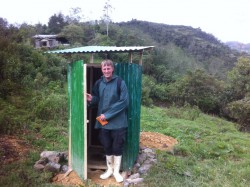
Expat/volunteer Eddie with one of the latrines he organized in the annex Taulia, just a 45 minute walk up the hill from the town of Molinopampa.
Where are you originally from?
Washington D.C.; then Pensacola, Florida; then Boston, Sacramento, Austin, and finally Fort Collins.
In which country and city are you living now?
Peru, in a relatively small town named Molinopampa in the region of Amazonas
How long have you lived in Peru and how long are you planning to stay?
Lived here with my wife for about 1 1/2 years.. planning on staying about another year.
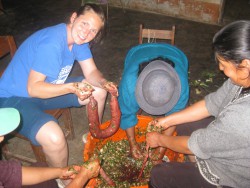
Wife Andrea making blood and cabbage sausage with some of the women in town. Without much refrigeration in town, most animals have to be processed right away into dried pieces or fried chunks, or sausage that can be cooked later.Why did you move to Peru and what do you do?
Joined the Peace Corps to save the world, US government decided this would be the best place for me and the wife to do so. I work with the municipality trying to find ways to improve their water systems, my wife is a nurse who works with the local health post.
Did you bring family with you?
Just my wife.
How did you find the transition to living in a foreign country?
Decent, only need to abandon all the comfortable elements you might be used to in the states (padded furniture, hot water, instant food, car transport)and read just to enjoying a simpler, more natural way of life (walking places, laundry by hand, building a fire for cooking).
Was it easy making friends and meeting people; do you mainly socialise with other expats?
My wife is an expat and I won't ever ignore her, but the rural community here has been more hospitable as I could ever imagine.. And I can imagine a lot. It's like one big university campus over here where everyone in town knows everyone else and it takes a little while just to walk to the plaza because of the need to chat with people.
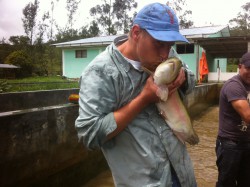
At the regional government trout farm where we have to give special care to the larger 'reproductors'.What are the best things to do in the area; anything to recommend to future expats?
If you would like to learn anything about cows, this is the place to do it. Huge lactose area we have here and if you are in the mood for more historical sites, there are plenty south of our regional capital, Chachapoyas, just 90min west of here.
What do you enjoy most about living in Peru?
The community is very friendly and the festivals are epic.
How does the cost of living in Peru compare to home?
All depends on one's perspective. Regardless, we can comfortably live here on very little money. Monthly rent and food costs often can stay around $100 per person.
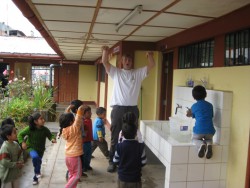
Teaching handwashing skills to the kindergarten. Kids really like the idea of shaking hands dry when there is not a clean towel to use.What negatives, if any, are there to living in Peru?
Obviously being away from immediate family is rough, also would enjoy having a greater selection of beers.
If you could pick one piece of advice to anyone moving to Peru, what would it be?
Like a car in city freeway, do not try to move faster or slower then those around you; in other words, don't try to accomplish much more things or at faster pace then the Peruvians you'll be living among.
What has been the hardest aspect to your expat experience so far?
Having to be creative with each and every day. No solid schedule for us here in cow country and never really know what we'll be spending each day doing when we walk out the door.
When you finally return home, how do you think you'll cope with repatriation?
Slowly, and with the help of plenty of TV stows and movies that we've been missing for the last couple years.
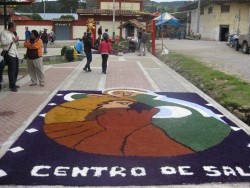
During Corpus Christi, one of the largest festivals in town during the month of June; large elaborate rugs are created in the plaza with colored sawdust only to be later stomped over by a church procession.What are your top 5 expat tips for anyone following in your footsteps?
Best representation humanly possible of life as a North American in a small rural town in the north of Peru. More pictures and videos then anything else. A nice site to stop by from time to time.
How can you be contacted for further advice to future expats coming to your area?
Through my email.. and then again there's a 'contact us' section on the blog that mostly anyone should be able to use.

Expat/volunteer Eddie with one of the latrines he organized in the annex Taulia, just a 45 minute walk up the hill from the town of Molinopampa.
Here's the interview with Eddie...
Where are you originally from?
Washington D.C.; then Pensacola, Florida; then Boston, Sacramento, Austin, and finally Fort Collins.
In which country and city are you living now?
Peru, in a relatively small town named Molinopampa in the region of Amazonas
How long have you lived in Peru and how long are you planning to stay?
Lived here with my wife for about 1 1/2 years.. planning on staying about another year.

Wife Andrea making blood and cabbage sausage with some of the women in town. Without much refrigeration in town, most animals have to be processed right away into dried pieces or fried chunks, or sausage that can be cooked later.
Joined the Peace Corps to save the world, US government decided this would be the best place for me and the wife to do so. I work with the municipality trying to find ways to improve their water systems, my wife is a nurse who works with the local health post.
Did you bring family with you?
Just my wife.
How did you find the transition to living in a foreign country?
Decent, only need to abandon all the comfortable elements you might be used to in the states (padded furniture, hot water, instant food, car transport)and read just to enjoying a simpler, more natural way of life (walking places, laundry by hand, building a fire for cooking).
Was it easy making friends and meeting people; do you mainly socialise with other expats?
My wife is an expat and I won't ever ignore her, but the rural community here has been more hospitable as I could ever imagine.. And I can imagine a lot. It's like one big university campus over here where everyone in town knows everyone else and it takes a little while just to walk to the plaza because of the need to chat with people.

At the regional government trout farm where we have to give special care to the larger 'reproductors'.
If you would like to learn anything about cows, this is the place to do it. Huge lactose area we have here and if you are in the mood for more historical sites, there are plenty south of our regional capital, Chachapoyas, just 90min west of here.
What do you enjoy most about living in Peru?
The community is very friendly and the festivals are epic.
How does the cost of living in Peru compare to home?
All depends on one's perspective. Regardless, we can comfortably live here on very little money. Monthly rent and food costs often can stay around $100 per person.

Teaching handwashing skills to the kindergarten. Kids really like the idea of shaking hands dry when there is not a clean towel to use.
Obviously being away from immediate family is rough, also would enjoy having a greater selection of beers.
If you could pick one piece of advice to anyone moving to Peru, what would it be?
Like a car in city freeway, do not try to move faster or slower then those around you; in other words, don't try to accomplish much more things or at faster pace then the Peruvians you'll be living among.
What has been the hardest aspect to your expat experience so far?
Having to be creative with each and every day. No solid schedule for us here in cow country and never really know what we'll be spending each day doing when we walk out the door.
When you finally return home, how do you think you'll cope with repatriation?
Slowly, and with the help of plenty of TV stows and movies that we've been missing for the last couple years.

During Corpus Christi, one of the largest festivals in town during the month of June; large elaborate rugs are created in the plaza with colored sawdust only to be later stomped over by a church procession.
- As mentioned, don't come into the area expecting to accomplish huge feats; it's the small changes in the community and the relationships with the new friends that make the true difference.
- Learn to get used to rain and mud; you'll be outside living through it day after day after day..the rainy season typically lasts Dec-April.
- Pick up a USB internet modem and use the pre-pay service or get a good plan in one of the big cities; very surprised to see that internet, though very slow, works over the cell phone towers. Without it blogging would be impossible.
- Stay away from tour companies/agencies when looking to get to cool sites in other parts of the country. Friend of mine told me this and it's absolutely true. Most any place that a tourist will want to visit is near towns that people live in and travel to-from regularly. Ask around for local/cheap transport to the nearest town, and then figure it out, the locals should know.
- Enjoy the music and the local festivals, there's nothing like it and will be missed when repatriating back into life in the states.
Best representation humanly possible of life as a North American in a small rural town in the north of Peru. More pictures and videos then anything else. A nice site to stop by from time to time.
How can you be contacted for further advice to future expats coming to your area?
Through my email.. and then again there's a 'contact us' section on the blog that mostly anyone should be able to use.
Grab a featured expat badge that links to this interview!
 Copy and paste code to display the Featured Expat Badge:
Copy and paste code to display the Featured Expat Badge:Comments » No published comments just yet for this article...
Feel free to have your say on this item. Go on... be the first!
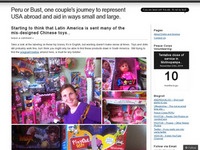 Eddie is an American expat living in Peru. Blog description: If you are bored with this site, it's not my fault.
Eddie is an American expat living in Peru. Blog description: If you are bored with this site, it's not my fault.





